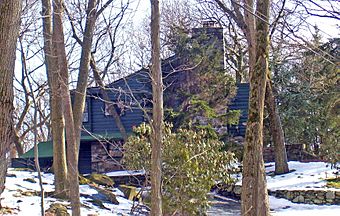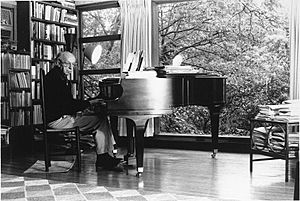Aaron Copland House facts for kids
|
Aaron Copland House
|
|

North elevation, 2009
|
|
| Location | Cortlandt Manor, NY |
|---|---|
| Nearest city | Peekskill |
| Area | 2.5 acres (1.0 ha) |
| Built | 1940s |
| Architectural style | Modern Movement |
| NRHP reference No. | 03000245 |
Quick facts for kids Significant dates |
|
| Added to NRHP | September 19, 2003 |
| Designated NHL | October 6, 2008 |
The Aaron Copland House, also known as Rock Hill, was the home of famous American composer Aaron Copland. He lived here for the last 30 years of his life. Today, it is a special place for American music.
The house is in Cortlandt Manor, New York, United States. It was built in the 1940s. In 2003, the house and its garage were added to the National Register of Historic Places. Five years later, in 2008, it became a National Historic Landmark. This means it's a very important historical site. It is the only National Historic Landmark linked to a classical music figure in the U.S. The land around the house has a beautiful garden and natural woods. In 2009, it was named a Certified Wildlife Habitat.
Copland started spending weekends and summers in the countryside in the 1930s. He found that living in nature helped him compose music. After living in a few different places, he bought this modern ranch-style house in the 1960s. He then lived there all the time. The house's style is said to match Copland's music. After he passed away in 1990, a group called Copland House, Inc. was formed. Their goal was to protect and preserve the building.
A Home for Composers
The Aaron Copland House is now a creative center for music. It has a special program for composers.
The Residency Program
The program is called the Copland House Residency Awards. It started in 1998. It is part of the Save America's Treasures program. This program helps new or mid-career American composers. They get to live and work at Rock Hill for a few weeks.
- Composers stay for three to eight weeks.
- They receive money for food.
- They can use a car.
- They can bring their spouse or partner.
- They cannot bring children or pets.
Allen Shearer was the first composer to stay here in 1998. Many other talented composers have also been part of this program. These include Pierre Jalbert, Richard Danielpour, Robert Xavier Rodriguez, Robert Paterson, Judith Lang Zaimont, Andrew Norman, Derek Bermel, Du Yun, Henry Threadgill, Alvin Singleton, Dave Douglas, Christopher Theofanidis, and Hannah Lash.
Music From Copland House
In 1999, the Copland House started its own music group. It's called Music From Copland House (MCH). This group plays American music. They first performed at Merkin Concert Hall in 1999.
Concert Series
In 2009, a regular concert series began. It is called Copland House at Merestead. These concerts take place at the historic Merestead Estate in Mount Kisco, New York.
The House and Grounds
The Rock Hill property is about 2.5-acre (10,000 m2) in size. It is located on Washington Street. The area around it is residential. There are other large houses on big lots. The land is gently rolling and wooded.
Getting to the House
A curving driveway leads from Washington Street. There is a rock with "Rock Hill" spelled out on it. A simple white mailbox is also there. The driveway leads to a parking area. The property has many landscaped areas. There are also rock gardens. Several types of trees not common to the area have been planted here.
The Main House
The house sits on the highest part of the property. It is a one-story building. It has an L-shape. It is made of wood on a stone foundation. The foundation can be seen on the north and south sides. On the south side, it sticks out to make room for Copland's studio. This studio has a wooden deck. The house has vertical wood siding. It has an asphalt roof. Stone chimneys are on both ends of the house. There is a small kitchen area on one corner.
The house has many large windows. These are called picture windows. The studio has glass walls on two sides. Steps lead up to a slate patio. This is where the main entrance is. Another set of stone steps leads to a secondary entrance by the kitchen.
Inside the House
The house has about 2,300 square feet (210 m2) of space. It has six rooms. A long hallway divides the rooms. Each room has at least three windows. The walls are decorated with art from Copland's own collection. These are mostly works by his friends.
Copland's Studio
The most important room is the studio. It is 17-by-24-foot (5.2 by 7.3 m). It has carpeted wood floors. It offers amazing views through its glass walls. There are bookshelves filled with Copland's personal books. A collection of recorded American music is also here. The main furniture is Copland's grand piano. His work desk was made by a local farmer. He also had a wooden chair from Harvard University.
Bedrooms and Library
Across the hall is the master bedroom. It is 12-by-16-foot (3.7 by 4.9 m). It has a queen-size bed and two tables. Bookshelves under the windows hold Copland's music journals. These go back to 1924. The next room is a library. It has tall bookshelves. These hold large music scores by Copland and other composers. There are also many other books.
Living Room and Kitchen
The living room is at the end of the hall. It has wood paneling. There is a large fireplace. It also has some of Copland's chairs and a dining area. The kitchen has linoleum flooring. It has wood paneling and drywall. It has kitchen appliances and a small table.
Other rooms include guest bedrooms and bathrooms. Stairs lead to a basement. Copland used the basement for his archives and office work.
The Garage Apartment
Near the house is a two-story garage. It has a one-bedroom apartment attached. It looks similar to the main house. It has not been changed since Copland lived there. It is an important part of the property's history.
History of Rock Hill
Aaron Copland was born in Brooklyn. He lived in cities for the early part of his career. After studying in Paris, he became a famous composer. He traveled a lot but always returned to New York City.
Seeking Country Life
As a boy, Copland spent a summer at a camp. He remembered this time fondly. This led him to spend summers in the countryside. In 1929, he spent a month in Briarcliff Manor. The next year, he spent six months in Bedford. During this time, he finished his Piano Variations.
In the 1930s, he lived in other country towns. These included Woodstock and Ridgefield, Connecticut. He always found that country life helped his music. In 1947, he decided he needed his own country place. He rented a house in Palisades. He liked that it was country but still close to the city.
Buying His Own Home
In 1952, Copland bought his first house. It was called Shady Lane Farm in Ossining. Here, he wrote important works like Orchestral Variations. By 1960, he needed a new home.
His partner, Victor Kraft, found Rock Hill. A local architect had designed it 20 years earlier. Copland loved the property. He said the studio looked like a place where a composer could write music. He bought the house on November 1, 1960. He lived there for the rest of his life.
Copland's Life at Rock Hill
The house's style matches Copland's music. Both are simple and elegant. The house blends into nature. Its dark green wood and stone fit in well. The stone foundation seems to be part of the natural rock. The large windows connect the inside to the woods. Copland only added a guest apartment to the garage in 1962.
Copland had a regular daily routine. He woke up and had a light breakfast. He then handled his letters. After lunch, he met visitors. He helped many younger composers. This earned him the nickname "The Dean of American Composers." He had dinner in the evening. He composed only at night, when he felt it was best. Here, he wrote Connotations and Inscape. These were large orchestral works for the New York Philharmonic. He also wrote Duo for Flute and Piano, his last major work, in 1971. He wrote his last film score for Something Wild shortly after moving in. In his later years, Rock Hill was his base for travels. He guest-conducted his music worldwide. He also received many awards.
Preserving the House
In the late 1980s, Copland's health declined. He passed away in 1990. The house then needed repairs. The roof was failing, and wood was rotting. The heating system was not working well.
The Copland Heritage Association was formed to manage the house. They decided to sell it. But local residents worked to save it. They raised $150,000 for repairs. The town now owns the house. It leases it to Copland House, Inc. for $1 a year. The Aaron Copland Fund for Music and the town then set up the composer-in-residence program.
Under this program, American composers can apply to stay at the house. If approved, they get to live and work there. They receive money for food and can use a car. They can bring a spouse or partner, but not children or dogs. Allen Shearer was the first composer in residence in 1998. Other composers have included Richard Danielpour, Derek Bermel, Robert Paterson, Michael Brown, Michael Gilbertson, Joel Hoffman, and Judith Lang Zaimont.
 | Audre Lorde |
 | John Berry Meachum |
 | Ferdinand Lee Barnett |




